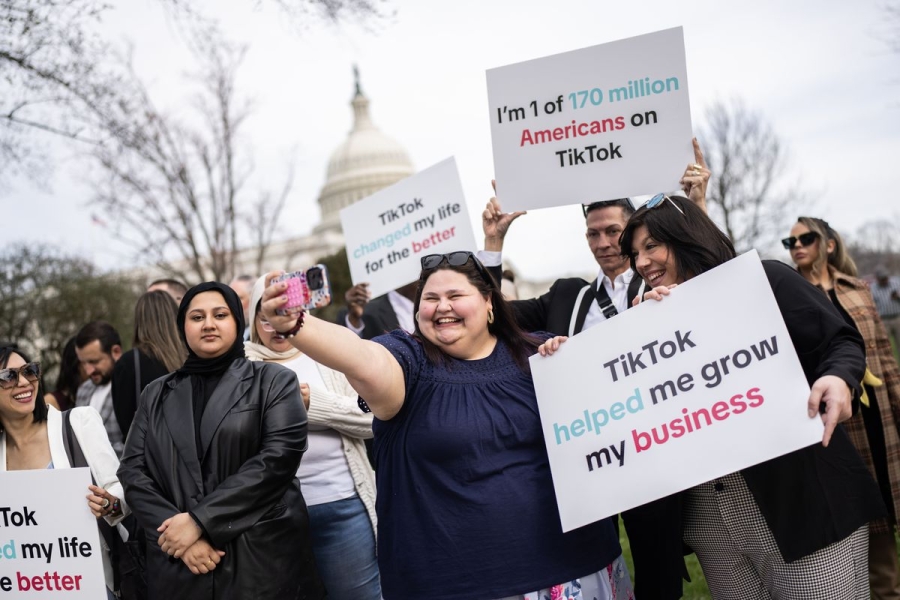The US House passed a bill that could ban the social video app, but sending TikTok into the ether won’t make social media any safer

A.W. Ohlheiser is a senior technology reporter at Vox, writing about the impact of technology on humans and society. They have also covered online culture and misinformation at the Washington Post, Slate, and the Columbia Journalism Review, among other places. They have an MA in religious studies and journalism from NYU.
TikTok, like any place on the internet where a ton of people are watching and sharing and competing for attention, is best understood in terms of both/and.
TikTok is both a vital platform for community building and plagued by dangerous misinformation. TikTok is both uniquely good at providing a means for non-influencers to reach a huge audience and a platform that has failed, again and again, to fairly and adequately moderate the content posted there. TikTok is both riddled with huge concerns about the privacy of the data it collects on its users and, just like any other major social media platform, intent on collecting that data as part of its business model.
On Wednesday morning, the House of Representatives overwhelmingly voted to pass a bill that could eventually lead to a US ban of the app. Before we get there, some big ifs are in play: if the Senate also passes the legislation, if President Joe Biden follows through on his intention to sign it should the bill arrive on his desk, and if TikTok’s parent company, ByteDance, doesn’t successfully sell TikTok to a non-Chinese owner before the legislation’s specified deadline.
Still, the threat of a ban was real enough to prompt TikTok to take action. In a push notification sent to users last week, TikTok urged its users to “speak up now — before your government strips 170 million Americans of their constitutional right to free expression.”
As a result, some House offices were inundated with calls, and some lawmakers who supported the bill accused TikTok of using the app to start a “propaganda campaign.” That language resonates with Republican calls late last year to ban TikTok, citing a viral but unfounded accusation that TikTok’s Chinese owners were “brainwashing” America’s youth with anti-Israel content by forcing it to get views thanks to the platform’s powerful recommendation algorithms.
The gray area of TikTok
One of the challenges of writing about social media is that both/and isn’t nearly as catchy as framing, say, TikTok as wholly good or wholly evil. TikTok’s counter-campaign to lawmakers’ push to frame the app as a data-guzzling Chinese propaganda tool is to point to the creators who make a living on the platform sharing educational, humorous, and otherwise wholesome content. Many of those creators are themselves speaking out about how the platform changed their life or helped them find a voice or earned them money.
Here are a couple both/ands about the bill to ban TikTok: It is both a bill that would potentially upend the livelihoods of people who use the platform as an income source and a bill that would not adequately protect user data across social media. It is both a bill that could have serious consequences for online expression and a bill that seems to be created by people with little understanding of what TikTok actually does.
“I have yet to hear policymakers talk about TikTok in a way that makes me think they know anything about it,” said Casey Fiesler, an associate professor of information science at the University of Colorado Boulder.
Fiesler, who herself has nearly 115,000 followers on TikTok, expressed frustration that policymakers pushing for a ban of the app routinely cited issues that are “absolutely not unique to TikTok,” such as content moderation, algorithmic unfairness, and data privacy concerns. “The thing that’s unique to TikTok is their relationship to China,” she added, “which is what makes them concerned about those particular things, I guess.”
As Jason Koebler wrote in his extremely smart essay on all this at 404 Media, “TikTok and the specter of China’s control of it has become a blank canvas for which anyone who has any complaint about social media to paint their argument on.” Sacrificing TikTok isn’t going to save anyone from the deeper problems of social media and algorithmic power. It just might make some lawmakers and advocates pushing for a TikTok ban feel good about themselves.
And, and, yeeting TikTok out of the landscape of social media platforms will hurt a lot of people. TikTok is an enormous hub for activism, Fiesler noted. The site is designed to show users things they want to see, and it’s better at it than a lot of other competitors, such as Instagram Reels.
Sure, the encroachment of the TikTok Shop on the For You Pages of many users has fundamentally changed the experience of being there, but the app remains a powerful tool for community building.
What happens if TikTok goes
If TikTok vanishes, some of the platform’s most successful, full-time creators will be able to find success elsewhere, on Reels or YouTube or streaming. Some already have.
The biggest loss, though, will likely not be felt by people who can make a living as “creators” or “influencers” entirely; a lot of people who make money on TikTok do so almost part-time.
Because TikTok’s algorithms remain skilled at allowing users with small followings to potentially find huge audiences, there are a ton of people on the platform who “don’t have the audience that could help them evolve into other areas of the entertainment industry,” said Zari A. Taylor, a doctoral candidate at the University of North Carolina at Chapel Hill who studies media and culture.
I like TikTok. I use it. I send way too many videos from the app to my friends. It can be, at its best, a place capable of fostering deep community and meaning. I’ve also covered some of the really bad stuff that TikTok amplifies to users, like videos about drinking Borax and Shop listings for snake oil “cures” that the company profits from.
It’s not a great idea to break up the both/and of TikTok. TikTok is both a valuable space and a platform that deserves deep scrutiny. But vaporizing it is not the solution.
A version of this story was published in the Vox Technology newsletter. Sign up here so you don’t miss the next one!
Source: vox.com






